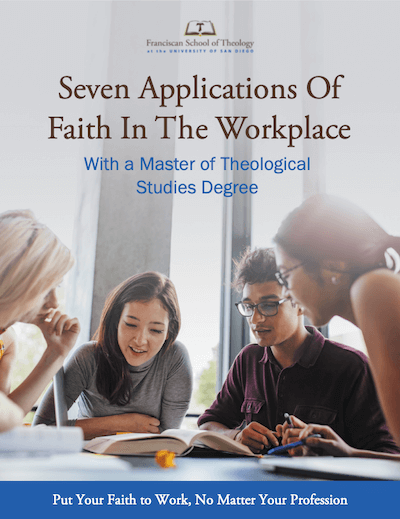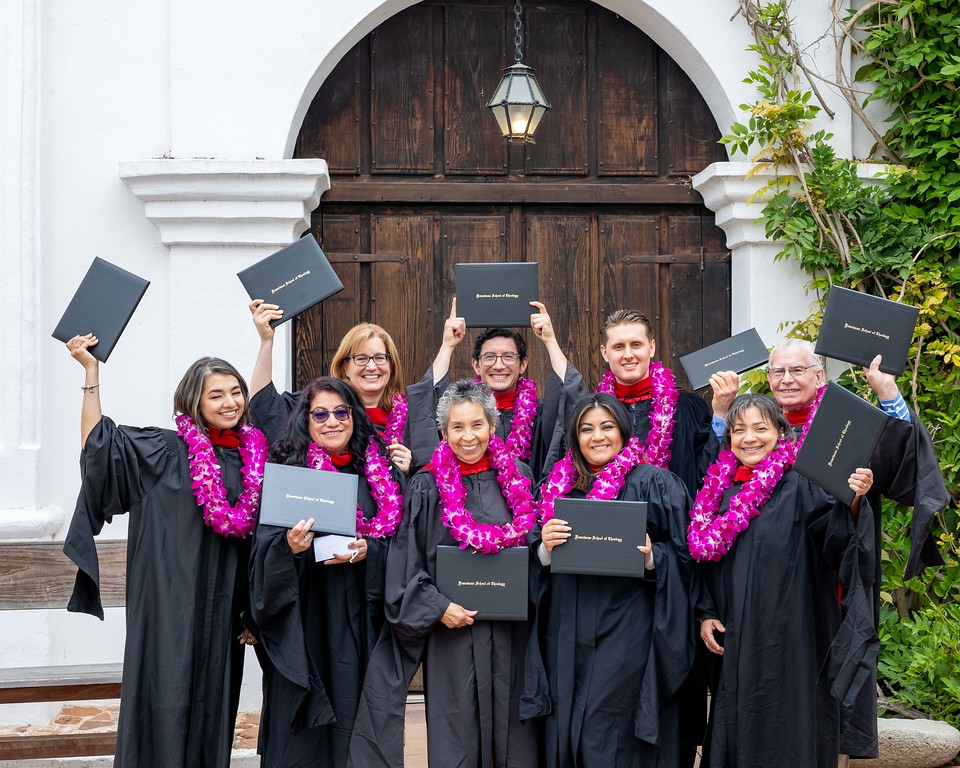As an academic discipline, theology examines the profound intricacies of faith, seeking not only to unravel the truths (and mysteries) contained in religious texts but also to explore their contemporary relevance to our lives. Theological scholars embark on a journey that goes beyond what they might already know about faith, challenging their assumptions and fostering a deeper understanding of religion and, ultimately, the world at large.
But how are theological studies relevant in our everyday lives, especially if we don’t work in a religious profession? What follows are eight compelling reasons to study theology, particularly as it pertains to personal growth, intellectual development, the acquisition of valuable life skills, and even furthering your career.
What Is Theology?
St. Anselm of Canterbury defined theology as “faith seeking understanding” — an explanation that still rings true today. Studying theology is a continuous, never-ending exploration of the divine, merging academic concepts with cultural understanding and often personal conviction. All Christians are called to engage in this pursuit, as formal theology involves asking sometimes difficult questions with the goal of fostering our growth in knowledge and love of God. Theology seeks not merely to relate what the Bible says, but ultimately what it means, with the answers to our questions to be found within its passages.
As an academic discipline, theology examines religion as expressed through the traditions, language, worship, literature, and art of a particular faith. It also takes a philosophical approach to age-old ethical questions as they pertain to faith, encouraging scholars to engage in spirited intellectual discussions and presentations of their research findings.
Many religious professionals pursue theological studies as part of their training, including clergy members, religious educators, chaplains, and spiritual counselors. Doing so is often an educational requirement, especially for ordained clergy members. However, many people in secular professions also study theology, as its foundational tenets apply to a wide range of topics, including social work, mental health counseling, law enforcement, music, art, nonprofit work, military service, and much more.
Why Does Theology Matter?
Academic theology is meant to serve as a tool for deliberate and careful contemplation of God, bridging the gap between mere surface identification and deeper understanding. Theological teachings can help make sense of a world in which things seemingly happen for no reason. Death, war, sickness, and grief can test our strength and faith in a divine presence (“Why would God let this happen?”) In theology, hard questions do not remain unanswered, even if the answers are complicated or difficult to digest.
From a purely academic standpoint, theology serves as a multidisciplinary exploration of religion. It combines philosophy, ethics, research, communication, psychology, history, sociology, language, and more in pursuit of deeper understanding. Any lover of learning, religious or not, can find theological exploration intensely compelling, and may even find that it can help establish some sense of mental and intellectual order amid chaos.
Nicholas B. Dirks, president and CEO of the New York Academy of Sciences, argues that studying humanities disciplines, including theology, is more important than ever.
“[The] humanities are still the place to ask fundamental questions about what it means to be human, what it means to lead a good life, what it means to try to construct a decent society, and how to understand not only ourselves but our neighbors…around the world,” Dirks says. “When you confront issues ranging from fear of dramatic climate change and extinction risks to the role that artificial intelligence plays in our everyday life, there’s a growing space for the humanities.”
Bishop Robert W. Barron emphasizes the importance of engaging one’s intellect when exploring faith. “One of the greatest commandments is to love the Lord your God with all your mind,” Bp. Barron writes in his book To Light a Fire on the Earth: Proclaiming the Gospel in a Secular Age (Image Books, 2017). “Theology is precisely the discipline by which we come to know God more deeply and more clearly.”
However, understanding the Divine on an intellectual level isn’t the ultimate goal. “The study of theology is not merely an intellectual exercise; it’s a spiritual practice,” Bp. Barron writes in Exploring Catholic Theology: Essays on God, Liturgy, and Evangelization (Baker Academic, 2015). “It draws us closer to God by helping us understand His nature, His works, and His will for us.”
The point of studying theology, therefore, is to never stop growing in our knowledge of faith. As we examine and ingest theological teachings from throughout human history, we engage in a form of never-ending conversion, much like that of Saint Francis of Assisi and his followers.
If studied in earnest, theology can be a means to becoming a better human, impacting various aspects of life, including faith, career, education, and relationships — but it takes sincere dedication and curiosity. Notably, many professed Christians lack knowledge of Christian theology, resulting in a disconnect between their stated faith and their comprehension of it.
For those who struggle to understand the practical applications of academic theology, Sister Ilia Delio, OSF, argues that it is more important now than ever before. “Theology is vital for addressing contemporary issues such as environmental degradation, social justice, and technological advancements, [since] it provides a framework for ethical reflection and action,” she writes in Making All Things New: Catholicity, Cosmology, Consciousness (Orbis Books, 2014). On a smaller scale, Sr. Delio also emphasizes theology’s ability to strengthen our relationships to one another by providing more meaningful ways to connect.
In an article for The Atlantic, writer Tara Isabella Burton adds a unique perspective, pointing out that one doesn’t even need to believe in God to study theology.
“To study theology well requires not faith, but empathy,” she writes. “It requires a willingness to look outside our own perspectives in order to engage with the great questions — and questioners — of history on their own terms.” Burton also posits that studying theology allows us to see into “the minds and hearts, fears and concerns, of those in circumstances that [are] so wildly different from [our] own.”
Seven Applications of Faith in the Workplace
Read how you can put your faith to work in any profession in this eBook

8 Reasons to Study Theology
1. Deepen your knowledge of God, scripture, and your faith.
Perhaps the most straightforward reason to study theology is the opportunity to dig deep into the foundation of your faith, cultivating a profound and nuanced understanding of God, scripture, and your personal beliefs. Theological studies go beyond surface-level knowledge, encouraging scholars to explore the intricacies of theological concepts, biblical narratives, and the rich tapestry of religious doctrines. This deepening of knowledge provides a solid foundation for spiritual growth, fostering a more meaningful and authentic connection with the divine through an academic lens.
2. Build a richer understanding of your faith’s historical context, why it matters, and how it applies to your life.
The study of theology involves exploring the historical roots of religion, unraveling the context in which specific religious beliefs and practices emerged. This historical perspective enhances an appreciation for the evolution of religious thought, shedding light on the reasons why certain beliefs matter and how they have shaped the course of human history. By understanding the historical context of your faith, you can better apply its principles to your life and navigate contemporary challenges with the wisdom gleaned from centuries of religious inquiry.
3. Learn to speak clearly about “difficult themes”.
The ability to articulate one’s beliefs is a crucial skill, not only for theologians, but for anyone who follows a particular faith. By studying theology, we develop the language and skills necessary to express complex ideas in a clear and accessible manner, whether we’re engaging in casual conversations with friends, interacting within religious communities, or addressing larger audiences, some of whom may not share our beliefs. This proficiency not only strengthens personal conviction but also contributes to a more informed and engaged community.
4. Learn to engage in dialogue with those who hold opposing views.
Theological studies encourage us to engage in thoughtful and respectful dialogue with those who may hold differing beliefs. By honing critical thinking skills and developing the ability to express ideas clearly, students of theology can navigate difficult or potentially fraught conversations with intellectual rigor and empathy. This capacity for dialogue promotes mutual understanding, breaking down barriers between individuals with a multitude of perspectives and contributing to a more inclusive and harmonious society.
5. Gain knowledge of other disciplines.
The interdisciplinary nature of theological studies broadens our intellectual horizons, exposing us to a wide range of academic fields. By integrating insights from history, philosophy, art, literature, psychology, ethics, and more, theology becomes a lens through which we can view the world in a more holistic manner. This multidisciplinary approach enriches our understanding of the interconnectedness of human experience, providing a well-rounded perspective that transcends the confines of religious discourse.
6. Build and strengthen community bonds.
If you have a strong desire to pursue theology, you are not alone. Doing so fosters a sense of community by connecting those of us who share a strong intellectual curiosity about faith. Engaging in theological discussions within a community setting not only deepens our individual understanding but also strengthens the bonds between fellow searchers. Shared exploration of religious beliefs creates a supportive environment where we can learn from one another, fostering a sense of belonging and solidarity that extends beyond the academic realm.
7. Build respect and tolerance based on knowledge rather than supposition.
Studying theology equips us with a nuanced understanding of different religious traditions, promoting respect and tolerance in an applied format (rather than merely theoretical). By gaining insights into the beliefs, practices, and histories of different faiths, we can develop a foundation for appreciating the richness of human spirituality. This knowledge becomes a powerful antidote to prejudice and stereotypes, fostering a culture of respect that is rooted in informed understanding rather than unfounded or ingrained assumptions.
8. Learn to live out your faith in tangible ways.
Theological studies are not confined to theoretical knowledge; they provide practical insights for living out your faith in everyday life. Through a deeper understanding of ethical principles, moral values, and spiritual practices, studying theology offers guidance on how to embody your faith in every action, decision, and interaction. This perpetual integration transforms theology from an abstract concept into a lived experience, enhancing the authenticity of our religious journey.
Skills Developed by Studying Theology
In addition to its spiritual and intellectual benefits, studying theology equips one with valuable skills that can be applied to a wide range of disciplines or professions.
First and foremost, by examining the beliefs and ideas of the past, students of theology learn to think deeply through the thoughts of others, thereby cultivating critical thinking skills and empathy.
When it comes to professional ability and career readiness, the Financial Times lists adaptability, creativity, and emotional intelligence among the most crucial “soft” work skills for the 2020s. Also valuable in today’s workforce are character traits that exhibit interpersonal and relational ability over industry-specific knowledge. Theological studies encourage the cultivation of all of these.
Other skills theology helps students develop include:
- Proficiency in debate
- Analytical writing
- Literacy in religious thinking and practice
- The ability to interpret data concisely
Not only do these skills contribute to one’s holistic development, but can also prepare us for a range of professions while enriching our personal and professional lives.
If you’re passionate about studying religion and feel called to deepen your understanding, consider earning a Master of Theological Studies. While this type of degree is ideal for anyone considering a career in religious education, lay ministry, parish support, academic research, or holistic counseling, an MTS has far-reaching applications that extend to almost any profession.
The Master of Theological Studies – Franciscan Theology (MTS-FT) is a 100%-online program offered by the Franciscan School of Theology in partnership with the University of San Diego. Grounded in Catholic teachings and focused on the Francsican approach to theology, the program provides a unique opportunity to deepen one’s intellectual understanding of faith while growing in their personal, professional, and spiritual journeys.
For more information about how the MTS-FT can further your personal and professional development, explore the program curriculum or connect with an enrollment advisor today.


![What is Theological Studies? [+ Degree Comparison]](https://onlinedegrees.sandiego.edu/wp-content/uploads/2022/01/what-is-theological-studies.jpg)
